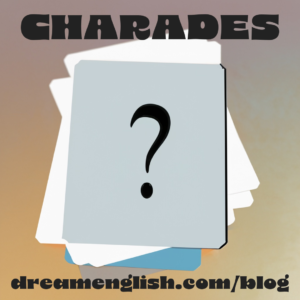Quick Game Facts:
- Name: Charades
- Recommended Ages: 6-12
- Materials Needed: Flashcards
- Prep Time: Minimal

Hello, language learners and enthusiastic educators! Are you ready to engage in a lively and non-verbal language activity that will enhance vocabulary and comprehension skills? Look no further than the classic game of “Charades”! This interactive and energetic game challenges students to express themselves through gestures and actions while others guess the word or phrase. So, gather your students, get those acting skills ready, and let’s dive into the world of “Charades” for an exciting language learning adventure!
Overview:
- Objective: Act out a word or phrase on a flashcard without speaking, while others guess what it is.
- Recommended Ages: 6-12
- Materials Needed: Flashcards
- Prep Time: Minimal
Setting Up the Game:
Setting up “Charades” is simple and prepares you for an engaging language experience! Prepare a set of flashcards with various words or phrases related to the vocabulary or topics you want to focus on. Ensure the flashcards are age-appropriate and aligned with the language proficiency of your students. Shuffle the flashcards and keep them facedown in a stack.
Playing Charades:
Get ready to put your acting skills to the test and challenge your classmates’ language comprehension with the game of “Charades”! Here’s how it works: Select a volunteer to be the first “actor” and have them pick a flashcard from the stack without showing it to anyone else. Instruct the actor to act out the word or phrase on the flashcard without speaking. Encourage them to use facial expressions, gestures, and body movements to convey the meaning. The other students will try to guess what word or phrase is being acted out. The first student to guess correctly becomes the next actor, and the game continues with a new flashcard.
Making It Educational:
While enjoying the entertaining game of “Charades,” let’s maximize the educational value! After each round, take a moment to discuss the word or phrase that was acted out. For high level students, encourage them to explain their thought process and reasoning behind their guesses. Use the opportunity to explore the meaning, usage, and context of the vocabulary being presented. Provide additional examples or challenges to deepen their understanding and reinforce language concepts.
Tips and Variations:
- Adjust the difficulty level of the game by selecting flashcards based on the age and language proficiency of the students.
- Incorporate specific language skills by using flashcards that require students to act out verbs, adjectives, or idiomatic expressions.
- Create themed sets of flashcards based on specific topics or units being taught, reinforcing vocabulary acquisition and content knowledge.
- Collaborative option: Divide students into teams and have them take turns acting out the flashcards. The team with the most correct guesses wins.
Benefits of Charades:
“Charades” offers a range of benefits for language learners. It enhances vocabulary retention and recall, promotes non-verbal communication skills, encourages creative thinking and problem-solving, fosters active listening and observation, and provides an enjoyable way to engage with language. The game boosts confidence, encourages teamwork, and creates a fun and interactive learning environment.
Conclusion:
Dear language enthusiasts, “Charades” is a dynamic and interactive game that challenges students to express themselves non-verbally while others guess the word or phrase. As they act out the vocabulary on the flashcards, their language comprehension and communication abilities will flourish. So, gather your flashcards, prepare to act, and let’s dive into the world of “Charades” for an exciting language learning adventure together! Stay tuned for more inspiring game ideas in our upcoming blog posts. Happy playing and learning!